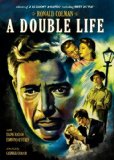| Reviews & Columns |
|
Reviews DVD TV on DVD Blu-ray 4K UHD International DVDs In Theaters Reviews by Studio Video Games Features Collector Series DVDs Easter Egg Database Interviews DVD Talk Radio Feature Articles Columns Anime Talk DVD Savant Horror DVDs The M.O.D. Squad Art House HD Talk Silent DVD
|
DVD Talk Forum |
|
|
| Resources |
|
DVD Price Search Customer Service #'s RCE Info Links |
|
Columns
|
|
|
Double Life, A
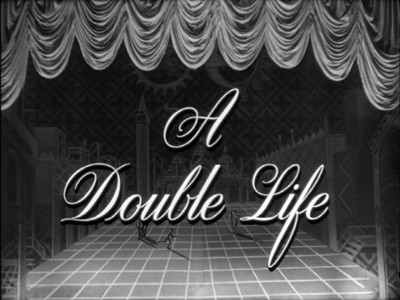
The Movie:
The atmospheric backstage drama A Double Life (1947) follows a famous stage actor as the intensity of his latest role leads him into madness and murder. Although it served as the first of several excellent collaborations between director George Cukor and filmdom's golden screenwriting couple Garson Kanin and Ruth Gordon, the film is perhaps best known for its memorable leading turn by debonair Ronald Colman. The self-loathing, mentally unstable Anthony John was a once-in-a-lifetime role and Colman plays it to the hilt, a strategy which paid off the following year when the veteran actor won a Best Actor Academy Award. Now, we all know that the Oscars love "going mad" performances, and the fact that it involves a Shakespearian actor adds a patina of class to the performance (the Oscars are nothing if not klassy). There was also a fair share of retroactive honoring in play here, since Colman had been a reliable leading man going all the way back to the mid-'20s. Olive Films' spiffy new edition of the film will undoubtedly spark more discussions about whether this was a genuinely deserved award or another example of Academy's pandering to sophistication and sentimentality.
From its opening few scenes (exteriors and interiors of a Broadway theater, nicely shot on location), one can tell that A Double Life was made with a lot of expertise and carefully thought out craftsmanship. Cukor, Kanin and Gordon all had prior experience with that scene, which adds some much-needed credibility to this often melodramatic story. When we first see Colman's Anthony John character, he is as a comfortably successful, marquee-worthy stage star, a somewhat complacent guy who sees fame as the unwanted side effect of honing his craft. Starring in a popular drawing room comedy with his ex-wife, Brita (Signe Hasso), he is persuaded into playing a very different role once his current project closes: Shakespeare's Othello. Brita is cast, too - as Othello's bride Desdemona - although she goes in with some trepidation since the two (who are still living together on friendly terms) broke up over Anthony's work-related temper tantrums. The production is mounted smoothly and becomes a huge success, but the constant repetition and jealous nature of the role starts to eat into Anthony's conscience. It becomes noticeable to Brita, when Anthony throws himself into the scene where Othello strangles Desdemona with reckless abandon, and to Anthony's press agent Bill Friend (Edmond O'Brien), who eventually becomes the near-victim of one of Anthony's crazy outbursts. His alarming behavior doesn't reach tragic proportions until, out on one of his solo nocturnal jaunts, Anthony meets a trusting waitress and aspiring actress named Pat Kroll (Shelley Winters). Pat takes pity on the broken-down man, inviting him to her place for a sexually charged yet uneventful meeting. Returning later on, however, finds Anthony consumed by a murderous desire to make Pat his Desdemona.
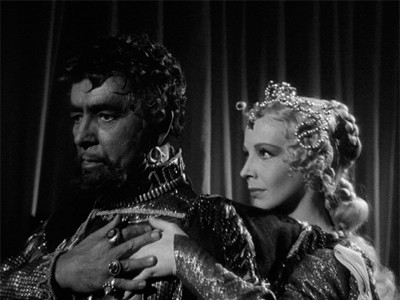
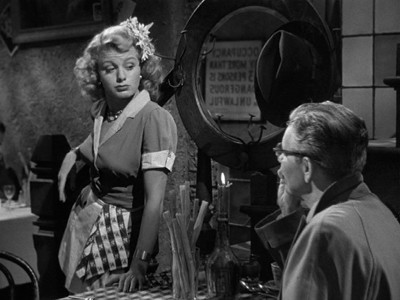
A Double Life shifts from an impressionistic, perceptively written backstage melodrama to a more routine police investigation film noir over the course of its running time. There are parts of it that work out beautifully, and other parts which seem overplayed and clunky. Ronald Colman does a decent job in the dramatic sequences, and he is especially effective in domestic scenes with the charming and expressive Signe Hasso (their scenes together serve as a kind of a prototype for the projects Kanin, Gordon and Cukor would soon do with Spencer Tracy and Katherine Hepburn). He is not so convincing in the Shakespeare scenes, however, and when Anthony's mental breakdown becomes more pronounced he turns implausibly hammy. The filmmakers' first choice, Laurence Olivier, probably would have done a better job (I'm also wondering how Claude Rains could have navigated the role). Colman's performance was helped out by George Cukor's sympathetic and sometimes risky direction. The director and screenwriters were apparently influenced by the boundary-pushing work of René Clair, which shows up in scenes like when Anthony attempts to shut out the din of an annoying party by covering his ears - with the film's soundtrack distorted in a nifty effect. The French influence also shows up in the film's extended Othello performances, which are overlong but nevertheless have a dreamlike quality that adequately captures the magic of live theater.
Seen today, A Double Life comes across like an intriguing if flawed experiment. It works best when Kanin and Gordon's script exposes the characters' vulnerability. The early segments with the not-quite-bonkers Colman dealing with Signe Hasso and Edmond O'Brien are quite wonderful, as are the scenes with Shelley Winters. Actually, Winters' touching sensitivity as the damaged-goods Pat comes across as a much more accessible, impressive performance than anything Colman came up with here. There's also a lot to recommend with Cukor's stylistic leanings, even if it doesn't have the same timelessness as some of his other films from this period (Adam's Rib and Born Yesterday have held up better).
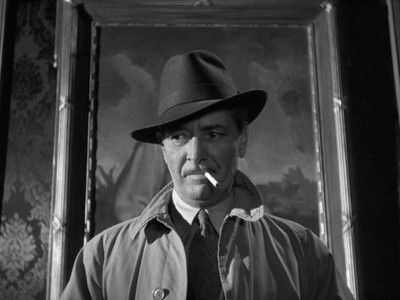
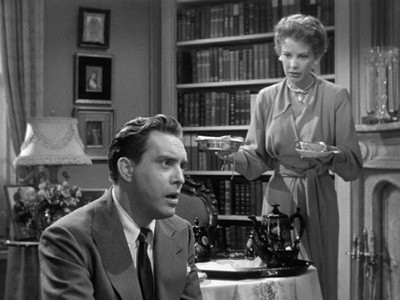
The DVD:
Olive Films continues their acclaimed series of bringing lesser-known classic-era Hollywood studio films back into circulation with A Double Life. This edition supplants an earlier DVD of the film issued by Republic in 2003 with newly remastered sound and image, along with a nicer looking cover design that draws from the film's original marketing art.
Video:
Seen side-by-side with the earlier DVD, this new disc is a huge improvement with more subtle balance and a sharper, cleaner picture. Although the film still has its share of dust and artifacts, overall it's a beautiful presentation that is a pleasure to watch.
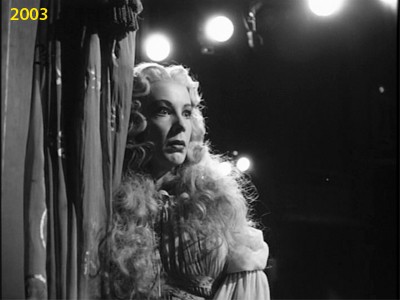
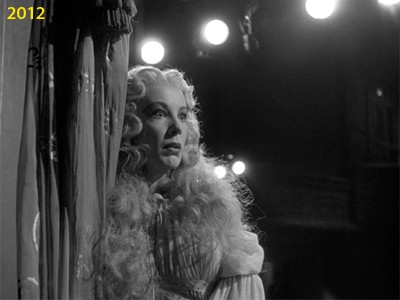
Audio:
The film's mono soundtrack is pleasant with no apparent glitches. Dialogue is clear and the score by Miklos Rosza sounds good, if sometimes overwhelming. No other audio or subtitling options are included.
Extras:
Unusual for Olive, we have a little bonus content! A Martin Scorcese Introduction (2:50) in which the director gives a college professor-ish reading on the film's importance and Cukor's impressionistic technique. This appears to have been sourced from a 1990s VHS edition of the film.
Final Thoughts:
Before it descends into an overripe potboiler, A Double Life presents an intelligent, knowing depiction of theater life in the '40s courtesy of a terrific screenplay by Garson Kanin and Ruth Gordon. The film also stands out due to Ronald Colman's award-winning performance and the gutsy, almost experimental direction of George Cukor. I was leaning towards putting a Highly Recommended rating on this. Compared with the other two Olive Films DVDs I've reviewed that have gotten that rating (Body and Soul and The Dark Mirror), however, A Double Life doesn't hold up nearly as well. Still worthwhile, however, so it gets heartily recommended.
Matt Hinrichs is a designer, artist, film critic and jack-of-all-trades in Phoenix, Arizona. Since 2000, he has been blogging at Scrubbles.net. 4 Color Cowboy is his repository of Western-kitsch imagery, while other films he's experienced are logged at Letterboxd. He also welcomes friends on Twitter @4colorcowboy.
|
| Popular Reviews |
| Sponsored Links |
|
|
| Sponsored Links |
|
|
| Release List | Reviews | Shop | Newsletter | Forum | DVD Giveaways | Blu-Ray | Advertise |
|
Copyright 2024 DVDTalk.com All Rights Reserved. Legal Info, Privacy Policy, Terms of Use,
Manage Preferences,
Your Privacy Choices | |||||||









